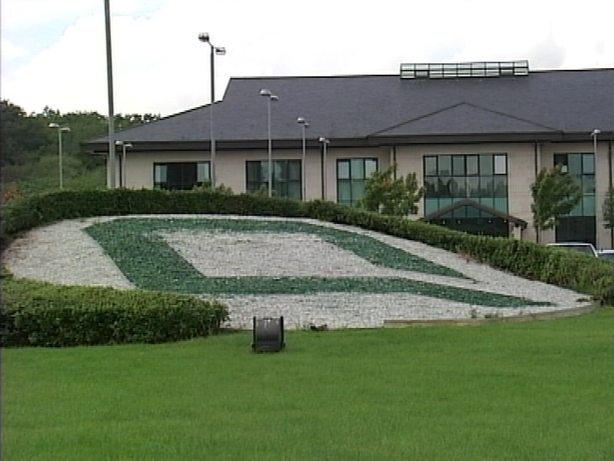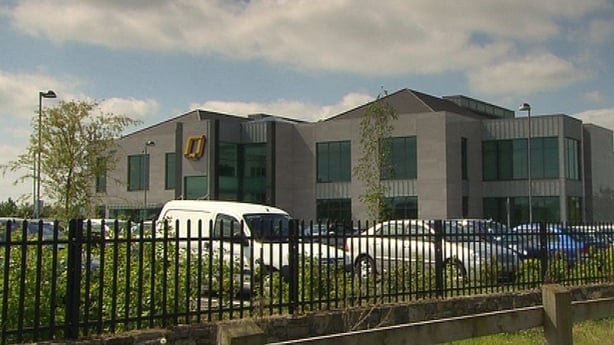The Central Bank inquiry into Quinn Insurance has heard that the full board of the company was not aware that its subsidiaries had entered into guarantees for the wider Quinn Group until years after they had taken effect.
The inquiry is to hear claims that the guarantees arose from decisions at three board meetings that it was claimed took place, but the inquiry’s legal team says did not.
The case was outlined during the opening statement of the inquiry’s legal practitioner team this morning during its first day of public hearings.
In his opening statement, Senior Counsel Eoin McCullough said the period being looked at was 6 October 2005 to 9 July 2008.
He said during the period Quinn Insurance Limited (QIL) was part of the Quinn Group Limited (QGL).
As an insurer, QIL had to set aside technical reserves and maintain a solvency level.
QIL had eight subsidiaries each of which was directly or indirectly owned by it and the assets of those subsidiaries were backing QIL's technical reserves.
He said what was of concern was that those subsidiaries gave guarantees to QGL as part of a new financing agreement, and under the terms of those guarantees each of the subsidiaries was jointly liable.
Ultimately, he said, the liabilities came to €1.2 billion, representing a very substantial interference with the technical reserves.
If the money had been drawn down, he said, QIL would not have been in a position to meet its liabilities.
He said former Quinn Insurance directors, Liam McCaffrey and Kevin Lunney, are suspected of contravening 1994 regulations requiring that internal procedures and control mechanisms are sound and adequate.
He said the inquiry must decide whether those regulations had been contravened, whether Mr McCaffrey and Mr Lunney were involved in the management of QIL and whether they participated in the contravention.
He said Mr McCaffrey was CEO of the Quinn Group during the period and on the board of QIL and seven of its eight subsidiaries.
Mr McCullough said that Mr Lunney was on the board of Quinn Group and QIL, as well as four of its eight subsidiaries.
He said it is claimed that they failed to ensure proper procedures were in place to ensure protections provided internally in QIL were followed and complied with.
He said the inquiry will hear that they failed to notify QIL's directors or investment committee of a proposal to enter into the guarantees and of the business of three board meetings in 2005, 2006 and 2007 of QIL which led to the guarantees.
He said the evidence demonstrates conclusively that QIL's board were not aware that QIL had entered into guarantees until March 2010, or that the meetings had even taken place.
He added that it is likely such meetings never took place at all, although this is a matter of dispute.
Mr McCullough said this was the consequence of failure to have sound and adequate controls procedures in place.
He said it was important that the inquiry considers whether the internal accounting mechanisms and control procedures were adequate in respect of the time that they took place.
He also said that no part of the allegations claim it caused the collapse of QIL, as that question is not part of this inquiry.
Mr McCullough added that the persons concerned may feel there should be others here under investigation, but that is also not a question for the inquiry, he said.

In his opening statement, Mr McCaffrey said that throughout the process of preparing the finance agreement in 2005, it was understood that QIL was a regulated entity and shouldn't be impacted.
But he said inadvertent flaws in documents gave a false sense of security and this was compounded by the documentation being used as a foundation for the 2006 and 2007 transactions.
He said A&L Goodbody, the firm's long-serving legal advisor, was charged with drawing up documentation with the clear understanding it should not impact QIL.
But, Mr McCaffrey said, unfortunately, it only covered QIL, where as it should have said "and its subdiairies" - a situation that did not come to light until 2010.
He said that while he wished he had spotted the error, he had not, and the fact was that he had taken and followed appropriate legal and financial advice. He added that those involved had been transparent and nothing was hidden.
Mr McCaffrey said the error did not arise from weaknesses in underlining processes of QIL. They were fit for purpose but ultimately they had relied on A& L Goodbody's advice.
Mr Lunney told the inquiry that he was aware of the Quinn Group's refinancing operation in 2005 but had practically no role in it. He said he had an understanding that as QIL was part of the wider Quinn group it would have to be part of the transaction but carved out.
He claimed that the papers showed how A&L Goodbody had advised that QIL would be kept insulated from the process.
He said he was shocked and surprised when it later emerged that it had not been. He added that he did not have any recall of how four key documents were signed by him. But his work often included confirmatory signing of documents in normal course of business, he claimed.
Mr Lunney said that if it had been considered by him or anyone else that the documents would have threatened QIL, it would have been a red flag for him and he wouldn't have done it.
Given that the 2005 transaction had been completed successfully it was resasonable to conclude, he suggested that for the 2006 and 2007 renewals it was assumed all matters relating to the original 2005 documents were in order and the process was more formulaic.
He said he had no recollection of being at board meetings where the guarantees were executed.
Mr Lunney said the minutes were held in A&L Goodbody and not sent around and he could not be responsible for documents that he didn't have control of.
One of the most experienced and respected legal firms was charged with doing the work, he said, and he and Liam McCaffrey relied on its advice.
He said this was not a process done with any lack of attention or care, but regrettably the legal advice was incomplete and flawed.
He admitted that he could have identified the flaws in the documents and sought resolution, but he did not and that will remain with him forever, he claimed.
He said there were appropriate procedures in place and the matters before the inquiry arise from circumstances beyond the reasonable control of the persons concerned.
Adrian Burke, Banking and Finance Partner with A&L Goodbody, said his firm had solely and specifically acted for Quinn Group Ltd, which was the borrower in the financing transaction.
He said it had acted for a number of issues for Quinn Insurance Ltd over time, but it was a select number of items and other companies had acted for it also. As a result, he said, the firm had limited involvement in the regulatory affairs for QIL.
In 2005 neither he nor anyone else in A&L Goodbody knew or had any awareness that the assets of subsidiaries of QIL were being used as technical reserves for it.
He said the Quinn Group's finance function chose the guarantors for the transaction and inadvertently chose QIL's subsidiaries. A&L Goodbody would not have known anything about the subsidiaries, he said.
As regards the board meetings required to give effect to the resolutions, he said his firm's legal advice at the time was that the relevant board meetings should be held and when the documentation was signed it should be sent back to it.

Quinn Insurance Limited collapsed into administration in early 2010 after the discovery of a massive financial hole in the firm's accounts, estimated to be more than €800 million.
It was later sold to Liberty Insurance for €1.
Six years ago the Central Bank fined QIL €5 million after it found that it had failed between October 2005 and March 2010 to maintain adequate solvency margins and had insufficient internal control mechanisms.
However, because the firm was in administration and the fine would therefore have come from the Insurance Compensation Fund, the penalty arising from the settlement was waived.
The regulator also carried out another investigation to establish whether there had been breaches of regulations by management of Quinn Insurance between 2005 and 2008.
It found there was reasonable grounds to suspect that "certain persons who were concerned in the management of Quinn Insurance participated in the commission of a suspected prescribed contravention" of EU non-life insurance regulations and launched a formal inquiry in 2015.
In 2017 Mr McCaffrey and Mr Lunney lost a High Court challenge they had brought against the inquiry.
The inquiry, which is expected to sit in public for two weeks, is chaired by retired High Court judge, Mr Justice Iarfhlaith O'Neill.
The other two members are barrister Ita Mangan and John Cashin, a former general counsel for Zurich Insurance Group.
The administration of Quinn Insurance has led to claims totalling €1.1 billion from the Insurance Compensation Fund.
A 2% levy was imposed on non-life insurance policies by the Government in 2012 to bridge a financial deficit left in the fund after the insurance company's collapse.







